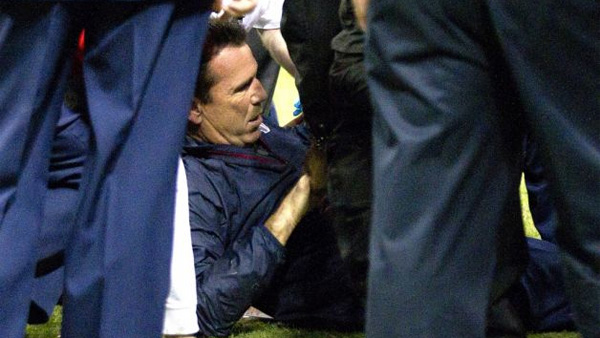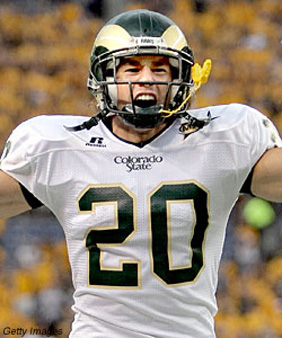DENVER — Shortly after the reports began to flood in on Sunday night, confirming the Denver Broncos would be welcoming one of their own back to the friendly confines of Dove Valley, Klein Kubiak took to Twitter and succinctly summed up the story.
“Welcome home dad,” he wrote, alongside the following photo.
Welcome home dad! #Broncos #BroncosNation pic.twitter.com/Q0cHb11IKZ
— Klein Kubiak (@kleinkubiak) January 19, 2015
All of a sudden, there they were: Gary Kubiak and John Elway yucking it up in an old Broncos team photo. Old teammates. Old colleagues. Old pals.
On Tuesday, they were reunited, with Elway, now the Broncos’ general manager, announcing Kubiak as the team’s new coach at a news conference.
Klein wasn’t the only one who got warm fuzzies after the unofficial announcement Sunday. Gary’s two other sons, appropriately named Klint and Klay, also felt the wave of nostalgia pour over them.
For Klint, his old Elway jersey came to mind.
“I think I wore that thing until I was about 10 years old and someone told me I had to grow up and take it off,” Klint laughed.
All grown up now, the 26-year-old former Colorado State Rams defensive back is knee-deep in the family business. At the moment, he’s on the road recruiting for the University of Kansas, where he serves as the football team’s receivers coach.
And he’s just as deep into the stresses that come with a career in football. He can remember exactly where he was when he watched those stresses literally bring his dad to his knees.
At the time, Klint was working as an assistant coach for the Minnesota Vikings. After a quick trip back to his home state of Texas and a close loss to the Dallas Cowboys, he wasted no time getting back to the office to prep for the next week’s game against the Washington Redskins. His dad’s prime time game against the Indianapolis Colts played in the background.
All of a sudden, the game cut through the noise to the forefront of not just the moment, but his life.
Alone in his office, Klint watched helplessly as a medical staff tended to his dad, then-coach of the Houston Texans, who had collapsed on his way to the locker room.
“You never want to see a family member go down on national TV,” he said. “It was an incredibly scary deal.”
Scary then gave way to complicated. The first tweets indicated Gary had suffered a heart attack. The next wave of news suggested he may have suffered a stroke. A third round of reports classified the incident as a “mini-stroke.”
And that was all before Sunday night had drawn to a close.
It wasn’t until Monday that reporters first ventured to explain a transient ischemic attack, which is officially what Gary suffered that night.
To be fair, it’s a condition that not only baffles reporters, but doctors alike. In 2014, Canadian woman Stacey Yepes had to record herself suffering from a third round of stroke-like symptoms before doctors were able to correctly diagnose her as suffering from a series of transient ischemic attacks.
Before she showed them the video, doctors dismissed Yepes’ symptoms as stress-related after stroke tests had come back negative. And she was sent home to experience the next terrifying round of symptoms — the same sort of symptoms that knocked a tough-as-nails former NFL quarterback on his back.
So in a way, for as unfortunate as it was that the Kubiak family’s drama had to play out on millions of TV sets, the fact that it was caught on camera may have been a blessing in disguise.
Doctors believe transient ischemic attacks are good predictors that a full-fledged stroke may be looming on the horizon. But if caught and treated early, as was the case with Yepes, overcoming the attacks and the potential for a future stroke can be as simple as changing your diet or adding cholesterol-lowering medication and blood thinners to your daily routine.
Gary’s treatment after the attack as well as what caused it are details that have never been made public, and Klint didn’t want to divulge those details. All he knows for sure is his dad made one concession: He was burned out.
“It happens to everybody,” Klint said. “Sometimes you just need a little time to regroup.”
So after he was dismissed by the Houston Texans following the 2013 season, Gary agreed to spend some time away from football. And let’s just say he spent that time at his own person fortress of solitude. Which is where exactly, Klint?
“All I’ll say is that it’s a farm in Central Texas,” Klint said coyly. “Or maybe it’s a ranch. I don’t know. He’s got cows out there, that’s about all I know.”
This is the place, Klint says, where his dad will retire someday. But that day is not today.
In fact, it took Gary all of about one month to regroup and accept an offer to become the offensive coordinator with the Baltimore Ravens. Perhaps nobody was happier to see him accept that offer than Klint.
“I think he had way to much idle time on his hands,” Klint said. “He’s a coach. That’s who he is. That’s what he’s passionate about. That’s what he gets up each morning wanting to do. When you’re not pursuing your passion, you’re not happy.”
But happy doesn’t always mean healthy. And Klint said his dad has had to find a happy marriage between the two.
“He’s modified the way he does things,” Klint said. “And health wise, I’d say he’s normal. I actually think he’s in even better shape.”
If seems easy to believe Klint when he says that, too. Because there may not be any other person on the planet who more closely monitors or emulates Gary Kubiak than his oldest son.
When he’s got a question about how to spread out a defense, he calls his dad. When he’s got a question about reducing his long term risks for a stroke — “something that’s on the forefront of all of my doctors’ minds these days,” Klint laughs — he calls his dad.
And when it’s family time, Gary does everything he can to break away from it all to be a dad. And whether you take Klint’s word for it or the Community Partners of Houston, a group that named him Father of the Year in 2009, Gary’s good at that gig too.
But if there’s one person who knows how to flip his dad’s switch back to football, it may be Klint.
“I just start talking about football schematics. That usually does the trick,” Klint said. “His brain is just wired that way. I’d know. I inherited it from him.”



